|
|
|
Sort Order |
|
|
|
Items / Page
|
|
|
|
|
|
|
| Srl | Item |
| 1 |
ID:
113895


|
|
|
|
|
| Publication |
2011.
|
| Summary/Abstract |
In this introduction, we outline the general conceptual framework that ties the various contributions to this special issue together. We argue for the importance of anthropology to "take on" mobility and discuss the advantages of the ethnographic approach in doing so. What is the analytical purchase of mobility as one of the root metaphors in contemporary anthropological theorizing? What are the (dis)advantages of looking at the current human condition through the lens of mobility? There is a great risk that the fast-growing field of mobility studies neglects different interpretations of what is going on, or that only patterns that fit the mobilities paradigm will be considered, or that only extremes of (hyper)mobility or (im)mobility will be given attention. The ethnographic sensibilities of fieldworkers who learn about mobility while studying other processes and issues, and who can situate movement in the multiple contexts between which people move, can both extend the utility of the mobilities approach, and insist on attention to other dynamics that might not be considered if the focus is first and last on (im)mobility as such. In this special issue, we do not want to discuss human mobility as a brute fact but rather analyze how mobilities, as sociocultural constructs, are experienced and imagined.
|
|
|
|
|
|
|
|
|
|
|
|
|
|
|
|
| 2 |
ID:
098399
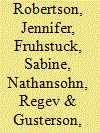

|
|
|
|
|
| Publication |
2010.
|
| Summary/Abstract |
What has distinguished anthropology from the other social sciences is an immersion in sustained fieldwork, itself premised on different kinds and levels of lived and shared experiences, usually with hitherto strangers in another culture in an often distant geographical location. In 2005 the U.S. Department of Defense inaugurated the experimental Human Terrain System, which embeds social scientists with combat brigades to enhance "operational effectiveness" and, supposedly, to reduce civilian casualties. A consensus is emerging among concerned anthropologists that ethnographic fieldwork abroad and within a broad spectrum of military activities and actors can, and must, be employed to challenge the U.S. Army's alarmingly naive concept of "weaponizing culture." The constituent essays in this thematic collection on the vicissitudes of the relationship between war and anthropology take up and complicate the premises of this challenge.
|
|
|
|
|
|
|
|
|
|
|
|
|
|
|
|
| 3 |
ID:
062598
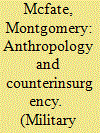

|
|
|
|
|
| Publication |
Mar-Apr 2005.
|
|
|
|
|
|
|
|
|
|
|
|
|
|
|
|
| 4 |
ID:
082384
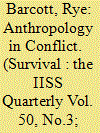

|
|
|
| 5 |
ID:
095831
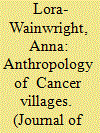

|
|
|
|
|
| Publication |
2010.
|
| Summary/Abstract |
This paper examines how villagers in rural Sichuan understand the development of cancer, how they attempt to make sense of why it seems widespread and of why it affects particular individuals. Lay aetiologies of cancer such as negative emotions, smoking, consuming alcohol and preserved vegetables are addressed in order to contextualise environmentally related factors, and explain why they may or not be resorted to. With reference to ethnographic examples, I argue that awareness of pollution's effects on health can only gain strength when it is consonant with locals' experience and moral parameters and when it is perceived to be productive in attracting media attention and obtaining redress from various levels of state bureaucracy.
|
|
|
|
|
|
|
|
|
|
|
|
|
|
|
|
| 6 |
ID:
141515
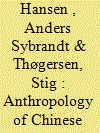

|
|
|
|
|
| Summary/Abstract |
The contemporary world is experiencing massive transnational population movements under the banner of higher education. This is in no small part due to the People’s Republic of China (PRC). Beginning in the late 1970s, PRC policies have actively encouraged young Chinese to go abroad to study as part of their higher education. Since then, the state has increasingly relinquished control over educational migration, turning instead to creating incentives for academic “talents” in key fields to either return to China or serve Chinese interests while living abroad (Liu 2014; Xiang and Shen 2009; Zweig, Fung, and Han 2008). Concurrent with this political relaxation, average Chinese incomes have risen dramatically, and higher education has grown gradually more integrated at a global level. The result has been remarkable. For some years now, China has been the largest global source of transnational students.
|
|
|
|
|
|
|
|
|
|
|
|
|
|
|
|
| 7 |
ID:
131769
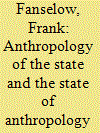

|
|
|
|
|
| Publication |
2014.
|
| Summary/Abstract |
This article provides a detailed account of the process of invention of a nationalist tradition for Brunei, the most tradition-conscious nation in Southeast Asia. It shows how Brunei's nationalist tradition emerged at the interface of colonial records, indigenous oral and written sources, ethnographic fieldwork, and anthropological theories. For this purpose the article traces the history of anthropological research in northern Borneo from its colonial beginnings to its postcolonial role in nation-building and shows how anthropology and anthropologists have - sometimes unknowingly, sometimes deliberately - played an active role in the shaping of Negara Brunei Darussalam.
|
|
|
|
|
|
|
|
|
|
|
|
|
|
|
|
| 8 |
ID:
084145
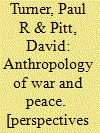

|
|
|
|
|
| Publication |
Massachusetts, Bergin and Garvey Publishers, 1989.
|
| Description |
xvi, 208p.
|
|
|
|
|
|
|
|
|
|
|
|
Copies: C:1/I:0,R:0,Q:0
Circulation
| Accession# | Call# | Current Location | Status | Policy | Location |
| 031260 | 303.66/TUR 031260 | Main | On Shelf | General | |
|
|
|
|
| 9 |
ID:
044354
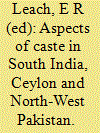

|
|
|
|
|
| Publication |
Cambridge, Cambridge University Press, 1960.
|
| Description |
viii, 147p.
|
| Series |
Cambridge papers in social anthropology; 2
|
|
|
|
|
|
|
|
|
|
|
|
Copies: C:1/I:0,R:0,Q:0
Circulation
| Accession# | Call# | Current Location | Status | Policy | Location |
| 006576 | 301/LEA 006576 | Main | On Shelf | General | |
|
|
|
|
| 10 |
ID:
091128
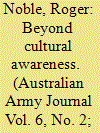

|
|
|
|
|
| Publication |
2009.
|
| Summary/Abstract |
This article contends that the experience of the early twenty-first century has highlighted a long-term systemic weakness in the formulation and execution of Western military strategy. The need for strategists to focus on people, culture and society is not just a counterinsurgency requirement; rather it should be an indispensible and enduring strand in all strategic calculations. There is a need to immigrate the thinking, methods, products and approach of anthropology into the formulation and execution of strategy. This is no easy task and the article identifies how this could be done through doctrine, education and practice.
|
|
|
|
|
|
|
|
|
|
|
|
|
|
|
|
| 11 |
ID:
169999
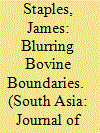

|
|
|
|
|
| Summary/Abstract |
Drawing on ethnographic fieldwork with butchers, cattle traders and beef eaters in South India, the aims of this paper are twofold. Firstly, it challenges two dominant assumptions made in respect of cattle slaughter and beef consumption in South Asia: one, that the beef trade directly concerns only Muslims, Dalits, Adivasis and Christians, and two, that respect for cattle is the near sole preserve of upper-caste Hindus. Secondly, given the strength of the empirical evidence against these two assumptions, it considers how such a stark framing of the debates along caste and communal lines has been sustained so successfully and for so long. Using insights from the anthropology of ignorance—to which this article makes a unique contribution—I argue that part of the answer lies in the strategic acts of not knowing what goes on at particular junctures along the chain from the cowshed to the dinner plate, which a number of different actors are complicit in working to maintain.
|
|
|
|
|
|
|
|
|
|
|
|
|
|
|
|
| 12 |
ID:
154681
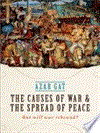

|
|
|
|
|
| Publication |
Oxford, Oxford University Press, 2017.
|
| Description |
xiv, 303p.: ill., diagrams, maps, tableshbk
|
| Standard Number |
9780198795025
|
|
|
|
|
|
|
|
|
|
|
|
Copies: C:1/I:0,R:0,Q:0
Circulation
| Accession# | Call# | Current Location | Status | Policy | Location |
| 059150 | 355.027/GAT 059150 | Main | On Shelf | General | |
|
|
|
|
| 13 |
ID:
119986
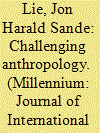

|
|
|
|
|
| Publication |
2013.
|
| Summary/Abstract |
Ethnography and anthropology are intrinsically linked, but recently other disciplines have started to draw inspiration from anthropological methods. The ongoing ethnographic turn in International Relations has spurred debate on what ethnography is, what it means and entails in practice, and how to apply it in International Relations. Some assert that the ethnographic turn could not have taken place without adopting a selective and antiquated notion of ethnography; others counter that this argument draws on a caricatured version of ethnography. This article offers one anthropologist's reflections on these issues, drawing on ethnographic work within an international organisation and a state apparatus - both of which are areas of study more common in International Relations than in anthropology. This is not an International Relations turn of anthropology, but the practical and methodological challenges it involves are relevant to the ethnographic turn of International Relations and the disjuncture between the ethnographic ideals and anthropological practice.
|
|
|
|
|
|
|
|
|
|
|
|
|
|
|
|
| 14 |
ID:
124060
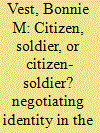

|
|
|
|
|
| Publication |
2013.
|
| Summary/Abstract |
This study examines the construction of US Army National Guard members' dual identities as soldiers and civilians and posits processes, including behavioral practice, spatial displacement, and narrativity, which soldiers use to reconcile these potentially contradictory identities to develop an understanding of themselves as "citizen-soldiers." Ethnographic evidence gathered from in-depth interviews suggests that for National Guard members who have never experienced deployment, the two identities of civilian and soldier are mostly separated. However, after experiencing deployment and reintegration, soldier and civilian identities become more intertwined and individuals must reorganize their identity according to different conceptions; integrating on a more permanent basis two different cultural modes of being. In light of the National Guard's increased participation in deployments post-9/11, this reorganization of identity is contributing to a shift in the meaning of "citizen-soldiery" in the current US context.
|
|
|
|
|
|
|
|
|
|
|
|
|
|
|
|
| 15 |
ID:
124451
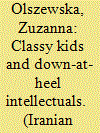

|
|
|
|
|
| Publication |
2013.
|
| Summary/Abstract |
This article reviews the ways in which class, status, social mobility and their cultural ramifications have been considered (or failed to be considered) in recent ethnographic studies of the Islamic Republic of Iran. It argues against the trend of privileging "resistance" to an oppressive state as a theoretical frame for documenting social phenomena in Iran: lifestyles and consumption patterns cannot be interpreted merely as signs of political rebellion because they are endowed with symbolic value as status attributes in a society whose class configurations are shifting. I present a number of sources and concepts that help to rethink these phenomena, and show how the experience of Afghan refugees living on the margins of Iranian cities illuminates both the opportunities and constraints created by the Islamic Republic's uneasy mix of political Islam, populism and neoliberalism. A focus on aspiration to upward mobility becomes a useful analytical lens that allows us to sidestep reductive dichotomies such as tradition/modernity or religion/secularism that are in practice blurred by its very pursuit.
|
|
|
|
|
|
|
|
|
|
|
|
|
|
|
|
| 16 |
ID:
098878
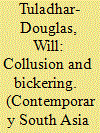

|
|
|
|
|
| Publication |
2010.
|
| Summary/Abstract |
By considering bickering, gossip and similar artful kinds of talk that reproduce social categories in a central Himalayan town, it is possible to see that participants in such talk collude in constructing a social landscape that grounds the relational distinctions foregrounded in those conversations. Following on from discussions that suggest anthropology of the environment must consider other social relations, here it is proposed that the environment is inescapably part of relational social distinctions. Collusion in the production of such shared landscapes, it is argued, is a key aspect of achieving ordinary life and, in certain contexts, can become the basis for resistance to the imposition of unwanted categorical distinctions.
|
|
|
|
|
|
|
|
|
|
|
|
|
|
|
|
| 17 |
ID:
113699


|
|
|
|
|
| Publication |
2012.
|
| Summary/Abstract |
At the core of China's rise lies the Chinese Communist Party's ability to reinvent itself and its administration. This article investigates one aspect of the gradual overhaul of administrative institutions, processes, and strategies, namely the increasing prominence of neoliberal ideas emanating from the discipline of public management in the recent emphasis on 'social management' (????) in government rhetoric and action. The article concludes that social management may ultimately entail a corporatist re-engineering of Chinese society that allows a considerable degree of pluralism while strengthening the leading role of the Party over society.
|
|
|
|
|
|
|
|
|
|
|
|
|
|
|
|
| 18 |
ID:
074385
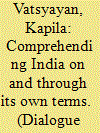

|
|
|
| 19 |
ID:
173830
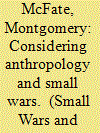

|
|
|
|
|
| Summary/Abstract |
Almost every war since the origins of the discipline at the beginning of the 19th century has involved anthropology and anthropologists. In some cases, anthropologists participated directly as uniformed combatants. Following the philosopher George Lucas, one might call this ‘anthropology for the military,’ having the purpose of directly providing expert knowledge with the goal of improving operations and strategy. In some cases this scholarship is undertaken, anthropologists have also studied State militaries, which following George Lucas might be considered ‘anthropology of the military.’ Sometimes this scholarship is undertaken with the objective of providing the military with information about its own internal systems and processes in order to improve its performance. At other times, the objective is to study the military as a human group to identify and describe its culture and social processes. Both ‘anthropology for the military’ and ‘anthropology of the military’ tend to have a practical, applied aspect, whether the goal is improving military effectiveness or influencing national security policy. On the other hand, anthropology as a discipline has also had a long history of studying warfare itself, known as ‘the anthropology of war.’ The papers in this special edition fall into these myriad categories of military anthropology.
|
|
|
|
|
|
|
|
|
|
|
|
|
|
|
|
| 20 |
ID:
112739
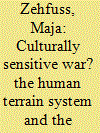

|
|
|
|
|
| Publication |
2012.
|
| Summary/Abstract |
Since around 2005, efforts have been made within the US military to highlight the significance of culture or the 'human terrain' for counterinsurgency operations. The US Army responded to the asserted 'cultural knowledge gap' by establishing an experimental programme called the Human Terrain System (HTS), which involves deploying social scientists alongside combat forces. While HTS was received favourably in the US mainstream media, it has been fiercely criticized by anthropologists in particular, who argue not least that participation in the programme would constitute a violation of their professional ethics, which require them to protect their research subjects. This article explores the anthropologists' critique and its limitations, arguing that it fails to tackle the problem of ethics deployed as a supposedly extra-political standard that can serve to (de)legitimize political projects. In particular, it is unable to dislodge the fantasy of protection at the heart of the argument for HTS.
|
|
|
|
|
|
|
|
|
|
|
|
|
|
|
|
|
|
|
|
|